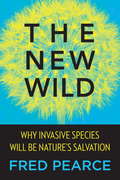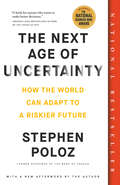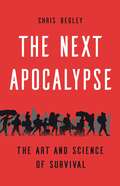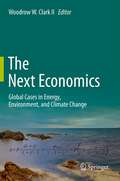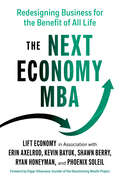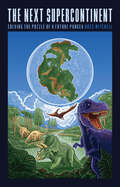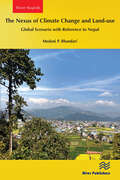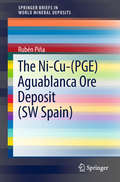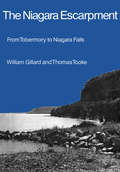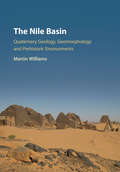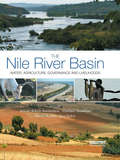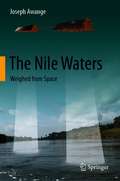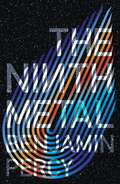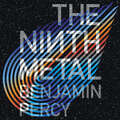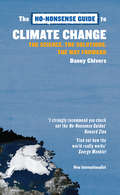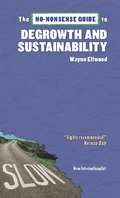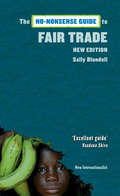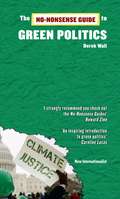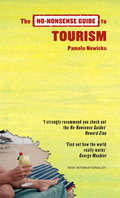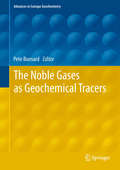- Table View
- List View
The New Wider World
by David WaughThis bestselling text offers both teacher and students the assurance that its new enriched content and range of material meets the exacting requirements of the latest GCSE and Standard Grade examinations.
The New Wild
by Fred PearceA provocative exploration of the "new ecology" and why most of what we think we know about alien species is wrong For a long time, veteran environmental journalist Fred Pearce thought in stark terms about invasive species: they were the evil interlopers spoiling pristine "natural" ecosystems. Most conservationists and environmentalists share this view. But what if the traditional view of ecology is wrong--what if true environmentalists should be applauding the invaders? In The New Wild, Pearce goes on a journey across six continents to rediscover what conservation in the twenty-first century should be about. Pearce explores ecosystems from remote Pacific islands to the United Kingdom, from San Francisco Bay to the Great Lakes, as he digs into questionable estimates of the cost of invader species and reveals the outdated intellectual sources of our ideas about the balance of nature. Pearce acknowledges that there are horror stories about alien species disrupting ecosystems, but most of the time, the tens of thousands of introduced species usually swiftly die out or settle down and become model eco-citizens. The case for keeping out alien species, he finds, looks increasingly flawed. As Pearce argues, mainstream environmentalists are right that we need a rewilding of the earth, but they are wrong if they imagine that we can achieve that by reengineering ecosystems. Humans have changed the planet too much, and nature never goes backward. But a growing group of scientists is taking a fresh look at how species interact in the wild. According to these new ecologists, we should applaud the dynamism of alien species and the novel ecosystems they create. In an era of climate change and widespread ecological damage, it is absolutely crucial that we find ways to help nature regenerate. Embracing the new ecology, Pearce shows us, is our best chance. To be an environmentalist in the twenty-first century means celebrating nature's wildness and capacity for change.From the Hardcover edition.
The Newman's Own Organics Guide to a Good Life: Simple Measures That Benefit You and the Place You Live
by Nell Newman Joseph D'AgneseIt’s fairly obvious that one can’t be a ‘perfect’ environmentalist. But that’s okay. Perfection isn’t the goal. A good life is. And a good life has as much to do with your intent as with the end result.” —from the IntroductionThe Newman’s Own Organics Guide to a Good Life is the essential book for those of us who can’t live in an organic hemp tepee but do care about our quality of life, global warming, clean water, and disappearing resources.Nell Newman shows you how to do what is within easy reach. Along with realistic, practical advice, she shows how and why living a more environmentally conscious life benefits you and your immediate surroundings. In addition to recycling and reusing, the book covers consumer-related steps such as• how buying and eating organic food supports small farms (and tastes better, too)• how you can buy clean power through your regular power company• which long-distance telephone companies offer competitive pricing and service while returning a portion of their profits to environmental and educational organizations• where to buy everything—from pots and pans to pet food—so that you can “vote with your dollar” and feel good about your purchasesPacked with profiles of fascinating—and sometimes zany—people and a heavy dose of sanity, this book is organized according to the way you really live, making it easy to identify what areas of change are viable for you. A resource directory of publications, retailers, groups, and associations is included in the back of the book.
The Next Age of Uncertainty: How the World Can Adapt to a Riskier Future
by Stephen Poloz*WINNER OF THE 2023 NATIONAL BUSINESS BOOK AWARD**FINALIST FOR THE 2023 OTTAWA BOOK AWARD**SHORTLISTED FOR THE SHAUGHNESSY COHEN PRIZE FOR POLITICAL WRITING**SHORTLISTED FOR THE 2022 DONNER PRIZE*NATIONAL BESTSELLERFrom the former Governor of the Bank of Canada, a far-seeing guide to the powerful economic forces that will shape the decades ahead.The economic ground is shifting beneath our feet. The world is becoming more volatile, and people are understandably worried about their financial futures. In this urgent and accessible guide to the crises and opportunities that lie ahead, economist and former Governor of the Bank of Canada Stephen Poloz maps out the powerful tectonic forces that are shaping our future, and the ideas that will allow us to master them.These forces include an aging workforce, mounting debt, and rising income inequality. Technological advances, too, are adding to the pressure, putting people out of work, and climate change is forcing a transition to a lower-carbon economy. It is no surprise that people are feeling uncertain.The implications of these tectonic tensions will cascade throughout every dimension of our lives—the job market, the housing market, the investment climate, as well as government and central bank policy, and the role of the corporation within society. The pandemic has added momentum to many of them. Poloz skillfully argues that past crises, from the Victorian Depression in the late 1800s to the more recent downturn in 2008, give a hint of what is in store for us in the decades ahead. Unlike the purely destructive power of earthquakes, the upheaval that is sure to come in the decades ahead will offer unexpected opportunities for renewal and growth.Filled with takeaways for employers, investors, and policymakers, as well as families discussing jobs and mortgage renewals around the kitchen table, The Next Age of Uncertainty is an indispensable guide for those navigating the fault lines of the risky world ahead.
The Next Apocalypse: The Art and Science of Survival
by Chris BegleyIn this insightful book, an underwater archaeologist and survival coach shows how understanding the collapse of civilizations can help us prepare for a troubled future.Pandemic, climate change, or war: our era is ripe with the odor of doomsday. In movies, books, and more, our imaginations run wild with visions of dreadful, abandoned cities and returning to the land in a desperate attempt at survival.In The Next Apocalypse, archaeologist Chris Begley argues that we completely misunderstand how disaster works. Examining past collapses of civilizations, such as the Maya and Rome, he argues that these breakdowns are actually less about cataclysmic destruction than they are about long processes of change. In short: it&’s what happens after the initial uproar that matters. Some people abandon their homes and neighbors; others band together to start anew. As we anticipate our own fate, Begley tells us that it was communities, not lone heroes, who survived past apocalypses—and who will survive the next.Fusing archaeology, survivalism, and social criticism, The Next Apocalypse is an essential read for anxious times.
The Next Economics
by Woodrow W. Clark IIThe Next Economics focuses on how the field of economics must change and incorporate environment, energy, health and new technologies that are called externalities for stopping and reversing climate change. The field of economics needs to become a science. Economics in this book for the Green Industrial Revolution which goes beyond the third industrial revolution since it covers cases, examples and specific economic analyses that both scientific and global. The book concerns climate change and how the Economics for Externalities, needs to range from energy and national security to infrastructure and communities. Solutions and cases of the "Next Economics" are based in western philosophical economic paradigms and how that is changing due to the significance of current global economic and societal concerns. Finally practical applications for economics are explored using global environmental and energy issues. Areas that need a fresh look at and be integrated with economics, include the environment, social and political issues, energy, health climate change and their infrastructures, as they are major components of the macroeconomics for the future. Based on past economic models, these subjects have been lost or ill fitted into modern economic theory. The challenge is to explore and to look deeply into economics in order to provide it a new direction with the possibility for understanding, changing and saving the planet from climate change. This book presents to economists and policy-makers alike areas of environmental economics, energy policy, health and social issues which are needed to stop and reverse climate change.
The Next Economy MBA: Redesigning Business for the Benefit of All Life
by Ryan Honeyman LIFT Economy Erin Axelrod Kevin Bayuk Shawn Berry Phoenix SoleilThis radical and rigorous rethinking of the traditional MBA program combines solid business principles with a commitment to environmental and social justice.Many current and aspiring entrepreneurs are looking for a solid business education that also deeply aligns with their progressive values. Based on a course field-tested with over 500 students, this book fills that gap. It covers traditional topics such as business strategy and structure, finance, marketing, recruiting, and branding from a socially just and environmentally regenerative perspective. And it also touches on topics such as strategies to reverse climate change, nonviolent communication, self-managing organizations, locally self-reliant economies, racial justice, and more. Traditional MBA programs are based on outdated principles that were developed during the Industrial Revolution-and they can be hugely expensive. Sustainable MBA programs, while laudable, are too incremental to make a sufficient impact. The Next Economy MBA is for entrepreneurs seeking to make business an active force for good. It draws on the authors' experience of working with over 300 social enterprises, from small organizations like Winona's Hemp and Heritage Farm to household names like Ben & Jerry's and Patagonia.Our current economy, what the authors call the Business as Usual Economy, has created a massive wealth gap, a climate crisis, racial division, and needless housing, food, and healthcare shortages. This book shows how businesses can pave the way to a Next Economy that meets the basic needs of all people and restores and protects the planetary ecosystem.
The Next Supercontinent: Solving the Puzzle of a Future Pangea
by Ross MitchellAn internationally recognized scientist shows that Earth’s separate continents, once together in Pangea, are again on a collision course.You’ve heard of Pangea, the single landmass that broke apart some 175 million years ago to give us our current continents, but what about its predecessors, Rodinia or Columbia? These “supercontinents” from Earth’s past provide evidence that land repeatedly joins and separates. While scientists debate what that next supercontinent will look like—and what to name it—they all agree: one is coming.In this engaging work, geophysicist Ross Mitchell invites readers to remote (and sometimes treacherous) lands for evidence of past supercontinents, delves into the phenomena that will birth the next, and presents the case for the future supercontinent of Amasia, defined by the merging of North America and Asia. Introducing readers to plate tectonic theory through fieldwork adventures and accessible scientific descriptions, Mitchell considers flows deep in the Earth’s mantle to explain Amasia’s future formation and shows how this developing theory can illuminate other planetary mysteries. He then poses the inevitable question: how can humanity survive the intervening 200 million years necessary to see Amasia?An expert on the supercontinent cycle, Mitchell offers readers a front-row seat to a slow-motion mystery and an ongoing scientific debate.
The Next Wave: The Quest to Harness the Power of the Oceans (Scientists in the Field Series)
by Elizabeth RuschJourney to the wave-battered coast of the Pacific Northwest to meet some of the engineers and scientists working to harness the punishing force of our oceans, one of the nature’s powerful and renewable energy sources. With an array of amazing devices that cling to the bottom of the sea floor and surf on the crests of waves, these explorers are using a combination of science, imagination, and innovation to try to capture wave energy in the hopes of someday powering our lives in a cleaner, more sustainable way.
The Nexus of Climate Change and Land-use – Global Scenario with Reference to Nepal
by Medani P. BhandariThe interplay between land use and climate change is a crucial aspect of sustainable development, especially in Nepal. This book delves into the intricate connections between land-use and climate change in Nepal, shedding light on significant challenges and potential opportunities. Nepal, with its diverse topography and ecosystems, is exceptionally susceptible to the impacts of climate change. The distinctive land-use patterns, encompassing agriculture, forest cover, and urbanization, significantly influence the country's climate resilience and carbon balance. However, rapid population growth, urban expansion, and changing land-use practices have led to environmental degradation and a surge in greenhouse gas emissions. The alarming deforestation, driven by agricultural expansion, infrastructure development, and unsustainable logging, has contributed to carbon emissions and the depletion of vital ecosystem services. Consequently, the conversion of forested land into agricultural fields has negatively affected biodiversity, soil erosion, and water resources, intensifying the vulnerability of communities to climate change. Nevertheless, embracing sustainable land-use practices like afforestation, reforestation, and agroforestry holds promise for mitigating the impacts of climate change and enhancing resilience. The promotion of climate-smart agriculture, watershed management, and community-based forestry can aid in conserving ecosystems, sequestering carbon, and improving livelihoods. This study illustrates the intricate relationship between land-use and climate change, emphasizing the importance of striking a balance in land-use practices, conserving forests, and biodiversity, and promoting sustainable agriculture. These efforts are indispensable for achieving climate resilience and sustainable development in Nepal. By addressing the nexus between land-use and climate change, Nepal can pave the way towards a more sustainable and climate-resilient future. The purpose of this book is to present the core concepts of this issue, inspire further research, and propose solutions to mitigate the problems caused by human disturbances in the Earth's ecosystem.
The Ni-Cu- (SpringerBriefs in World Mineral Deposits)
by Rubén PiñaThis book describes the Aguablanca Ni-Cu-PGE sulfide deposit, the first, and to date only, mineralization of this type in southwestern (SW) Europe. Since its discovery in 1993, this ore deposit has attracted the attention of the resource geology community due to its unusual geodynamic context, namely an active plate margin. The book focuses on the key features of the deposit and reports on the ore-forming processes that were most important for its formation.
The Niagara Escarpment: From Tobermory to Niagara Falls
by William H. Gillard Thomas R. TookeThis book provides an informal history and tour of the Niagara Escarpment, the backbone of Ontario and one of Canada's natural wonders. Stretching from Tobermory at the tip of the Bruce Peninsula to Niagara Falls, the escarpment exhibits a wide diversity of landscape, people, and industry, in the present and in the past. The authors have divided it into three major regions. the rugged northern region which retains much of its primitive beauty serves primarily as a haven for tourists and summer residents, although it was once a centre for fishing and lumbering. Change has come also to the middle area. Its waterpower once made it an industrial region, but today the land from Meaford to Dundas is largely agricultural. The south, so rich in the early history of Canada, is heavily settled and industrialized. Over 80 photographs, taken by William H. Gillard, who himself lives on 'the mountain,' capture the various facets of the region. The rugged cliffs of the Bruce Peninsula contrast with the pastoral lands beneath Mount Nemo; the neatly trimmed harbour at Tobermory counterpoints the Dundas swamp of Coote's Paradise. We see the interplay of industry and agriculture, from Owen Sound's grain elevators through Hamilton's blast furnaces to Jordan's vineyards, and recreation and culture, from tourist landmarks through Hockley Hills skiing to the museums of history and art. The text provides entertaining glimpses of some of the people and some of the events in the history of settlement and growth, proceeding from town to town, north to south. This readable book is the first to deal with the landscape and history of the entire Niagara Escarpment. It is a useful guide to one of the most interesting and historic areas of Canada.
The Nightcrawlers: A Story of Worms, Cows, and Cash in the Underground Bait Industry (Critical Environments: Nature, Science, and Politics)
by Joshua SteckleyHow does a banal earthworm become a valuable commodity? Lumbricus terrestris, otherwise known as the Canadian nightcrawler, is the most popular live bait used by recreational anglers throughout the world. Each year, as many as seven hundred million worms are handpicked from Ontario farmland for the bait market, earning the region the undisputed title of worm capital of the world. The Nightcrawlers goes deep into the empirical underground to see how capital confronts a diverse cast of human and nonhuman characters: stubborn worms, wealthy dairy farmers and their precious cow manure, immigrant pickers laboring at night, and worm wholesalers who undercut each other through tax fraud and money laundering. This eccentric tale of worms, cows, and cash reveals the inherent contradictions in capitalism's attempts to commodify the living world—including the soil organisms that are inches beneath our feet.
The Nightingale: ‘The nature book of the year’
by Sam Lee'Wondering and wonderful. The nature book of the year.' JOHN LEWIS-STEMPEL'This lovely book is almost as thrilling as the bird's immortal song - balm for a troubled soul and a glimpse of paradise.' JOANNA LUMLEY______________________________Come to the forest, sit by the fireside and listen to intoxicating song, as Sam Lee tells the story of the nightingale.Every year, as darkness falls upon woodlands, the nightingale heralds the arrival of Spring. Throughout history, its sweet song has inspired musicians, writers and artists around the world, from Germany, France and Italy to Greece, Ukraine and Korea. Here, passionate conservationist, renowned musician and folk expert Sam Lee tells the story of the nightingale. This book reveals in beautiful detail the bird's song, habitat, characteristics and migration patterns, as well as the environmental issues that threaten its livelihood.From Greek mythology to John Keats, to Persian poetry and 'A Nightingale Sang in Berkeley Square', Lee delves into the various ways we have celebrated the nightingale through traditions, folklore, music, literature, from ancient history to the present day. The Nightingale is a unique and lyrical portrait of a famed yet elusive songbird.______________________________'Sam Lee has brought the poetic magic that has long enchanted so many of his musical fans into the written word. Allow yourself to glimpse the world Sam sees, to be part of his love affair with the nightingale, and you will no doubt be delighted.' LILY COLE'A wonderful book.' STEPHEN MOSS'A magical marriage of the lyrical and practical: a book that makes us want to seek out the nightingale and then reveals how we can.' TRISTAN GOOLEY
The Nile Basin: Quaternary Geology, Geomorphology and Prehistoric Environments
by Martin WilliamsThe Nile Basin contains a record of human activities spanning the last million years. However, the interactions between prehistoric humans and environmental changes in this area are complex and often poorly understood. This comprehensive book explains in clear, non-technical terms how prehistoric environments can be reconstructed, with examples drawn from every part of the Nile Basin. Adopting a source-to-sink approach, the book integrates events in the Nile headwaters with the record from marine sediment cores in the Nile Delta and offshore. It provides a detailed record of past environmental changes throughout the Nile Basin and concludes with a review of the causes and consequences of plant and animal domestication in this region and of the various prehistoric migrations out of Africa into Eurasia and beyond. A comprehensive overview, this book is ideal for researchers in geomorphology, climatology and archaeology.
The Nile River Basin: Water, Agriculture, Governance and Livelihoods (Earthscan Series on Major River Basins of the World)
by Vladimir Smakhtin David Molden Seleshi Bekele Awulachew Don PedenThe Nile provides freshwater not only for domestic and industrial use, but also for irrigated agriculture, hydropower dams and the vast fisheries resource of the lakes of Central Africa. The Nile River Basin covers the whole Nile Basin and is based on the results of three major research projects supported by the Challenge Program on Water and Food (CPWF). It provides unique and up-to-date insights on agriculture, water resources, governance, poverty, productivity, upstream-downstream linkages, innovations, future plans and their implications. Specifically, the book elaborates the history and the major current and future challenges and opportunities of the Nile river basin. It analyzes the basin characteristics using statistical data and modern tools such as remote sensing and geographic information systems. Population distribution, poverty and vulnerability linked to production system and water access are assessed at the international basin scale, and the hydrology of the region is also analysed. This text provides in-depth scientific model adaptation results for hydrology, sediments, benefit sharing, and payment for environmental services based on detailed scientific and experimental work of the Blue Nile Basin. Production systems as they relate to crops, livestock, fisheries and wetlands are analyzed for the whole Blue and White Nile basin including their constraints. Policy, institutional and technological interventions that increase productivity of agriculture and use of water are also assessed. Water demand modeling, scenario analysis, and tradeoffs that inform future plans and opportunities are included to provide a unique, comprehensive coverage of the subject.
The Nile Waters: Weighed from Space
by Joseph AwangeThis book is useful to those in water resources management and policy formulations, hydrologists, environmentalists, engineers and researchers. Exploiting advanced statistical techniques and the latest state-of-the-art multi-mission satellites, surface models and reanalysis products, this book provides the first comprehensive weighing of the changes in the Nile River Basin’s (NRB: ~ 3,400,000 km2 ) stored waters' compartments, surface, soil moisture and groundwater, and their association to climate variability/change and anthropogenic impacts on the one hand. On the other hand, it argues on the need for equitable use of the NRB’s waters by all 11 countries within its basin, and doing away with obsolete Nile treaties that were signed by Britain, Egypt and Sudan, which prohibit the use of the Nile by 8 upstream countries. With Ethiopia’s construction of Africa’s largest dam (GERD; Grand Ethiopian Renaissance Dam) along the Blue Nile, which is expected to take several years to fill, the Nile is back on the news. Combined with Uganda’s Nalubaale, Kiira and Bujagali dams on the White Nile, these human-induced impacts (i.e., damming), coupled with those of climate variability/change, are expected to exacerbate tension with the low stream countries (Egypt and Sudan) fearing the cut in theNile’s total volume. Furthermore, the Nile river, arguably the world’s longest river (6800 km), impacts on the livelihood of over 300 million people of 11 countries within its basin. This population is expected to double in the next twenty-five years, thereby putting extreme pressure on its water resources. An in-depth analysis of changes in the Nile’s stored waters, therefore, is essential to inform its management and sustainable equitable use. Owing to its sheer size, however, obtaining in-situ data from “boots on the ground” is practically impossible, paving way to the space-based weighing of the Nile River Basin using a suite of high spatio-temporal remotely sensed and reanalysis products, as well as those of hydrological models. “Arguably, the Nile River is the most unique river in the world. It spans extremes of rainfall from being measured by meters to being measured by centimeters, from the humid tropics to the driest of deserts. Yet, thirsty people live throughout this basin and therefore the demands on its water resources are uneven. Knowing the water amounts throughout the entire Nile Basin is a critical step for governments and international treaties to avoid the “Tragedy of the Commons”. Africa can embrace this future through the leadership of Prof. Awange and others like him who have devoted their careers to Africa’s waters” —Doug Alsdorf, Ph.D., Professor of Geophysics at the Ohio State University (USA).
The Ninth Metal: The Comet Cycle Book 1 (The Comet Cycle #1)
by Benjamin Percy'Great characters, fine writing, totally engrossing' STEPHEN KING It might have been the end of days. Instead it was the beginning of something shockingly new. They called the comet Cain, after the astronomer who discovered it. It passed 500,000 miles from Earth. We were spared planetary destruction and granted a light show like no other. But, one year later, Earth span into the debris field left by the comet and a meteor storm struck. Roads, buildings and even a small town were annihilated.The meteors impacted heavily around the dying mining town of Northfall, Minnesota. It was the night of a mysterious double murder, the deed overshadowed by the discovery that the burning remains of the rock contained an unknown substance more precious than gold: the Ninth Metal. And with that discovery, everything changed.Benjamin Percy is an award-winning novelist, celebrated comic books writer and author of the Wolverine podcast. The Ninth Metal is the first of a cycle of novels set in a shared universe.Praise for The Ninth Metal:'Whether you choose to think of him as the Elmore Leonard of rural Minnesota or the Stephen King of Science Fiction, Percy - with his extraordinary and unrelenting eye - dishes up humanity like some kind of otherworldly blue plate special, at once deeply familiar and wildly new' Margaret Stohl, No. 1 New York Times Bestselling Author'Take one part dystopia, one part sci-fi, two parts apocalypse, then ride them roughshod through a bleak and bloody western, and it still wouldn't get close to what Ben Percy does here, which is blow open the core of humanity's dark heart' Marlon James, Booker Prize winning author of Black Leopard, Red Wolf'The Ninth Metal continues his streak of thrilling, incisive genre bending goodness. It's a sci-fi novel, a crime novel and a super-hero novel, too. Audacious and intelligent and exactly what I was dying to read' Victor LaValle, author of The Changeling
The Ninth Metal: The Comet Cycle Book 1 (The Comet Cycle #1)
by Benjamin PercyFrom award-winning author Benjamin Percy comes an explosive, breakout speculative thriller in which a powerful new metal arrives on Earth in the wake of a meteor shower, triggering a massive new 'gold rush' in the Midwest and turning life as we know it on its head. The first of a cycle of novels set in a shared universe. It might have been the end of days. Instead it was the beginning of something shockingly new. They called the comet Cain, after the astronomer who discovered it. It passed 500,000 miles from Earth. We were spared planetary destruction and granted a light show like no other. But, one year later, Earth span into the debris field left by the comet and a meteor storm struck. Roads, buildings and even a small town were annihilated.The meteors impacted heavily around the dying mining town of Northfall, Minnesota. It was the night of a mysterious double murder, the deed overshadowed by the discovery that the burning remains of the rock contained an unknown substance more precious than gold: the Ninth Metal. And with that discovery, everything changed.Benjamin Percy is an award-winning novelist, celebrated comic books writer and author of the Wolverine podcast. The Ninth Metal is the first of a cycle of novels set in a shared universe. (P) 2021 Houghton Mifflin Harcourt
The No-Nonsense Guide to Climate Change
by Danny ChiversJust as the need for action on climate change becomes more urgent and overwhelming, the campaign to deny that humans are causing it has gained more traction. This completely new book meets the sceptics head on, offering a guide to the science, an insight into the politics of climate justice and a clear sense of the way forward.
The No-Nonsense Guide to Degrowth and Sustainability
by Wayne EllwoodThis guide explores the idea of economic growth, tracing its history and questioning why it has become so unchallengeable and powerful when unlimited growth in a finite world is ultimately impossible. It illustrates how economics based on degrowth can be turned into a positive and how we can arrive at new levels of environmental sustainability without having turning the clock back to the Dark Ages. A title for anyone interested in economics, the psychology of consumerism and progressive change.Wayne Ellwood is former co-editor of New Internationalist magazine. He is author of the No-Nonsense Guide to Globalization (over fifty thousand sold).
The No-Nonsense Guide to Fair Trade
by Sally BlundellAn in-depth look at two decades of a movement that aims to challenge the ethical foundations of the global market.Transnational corporations look for the cheapest suppliers, while the fair trade movement insists on a premium for the producers at the start of the chain.Sally Blundell uncovers the origins of fair trade and what it is likely to become.
The No-Nonsense Guide to Green Politics
by Derek WallClimate chaos and pollution, deforestation and consumerism: the crisis facing human civilization is clear enough. But the response of politicians to it has been cowardly and inadequate, while environmental activists have tended to favor single-issue campaigns rather than electoral politics.The No-Nonsense Guide to Green Politics measures the rising tide of eco-activism and awareness and explains why it heralds a new political era worldwide.Derek Wall is a former principal speaker of the British Green Party. He is the author of numerous books, including Babylon and Beyond: The Economics of Anti-Capitalist, Anti-Globalist and Radical Green Movements.
The No-Nonsense Guide to Tourism
by Pamela NowickaThis guide demystifies the often invisible impacts of global tourism, one of the biggest industries in the world, from labor conditions to development by stealth, to the role of elites and the cultural impacts on both the visitor and the visited.It also takes in themes such as the gap year and the role of travel and vacations in Western cultures, and examines the "happy smiling faces" syndrome and asks whether this is just a reworking of old colonial relationships. Pamela Nowicka is a journalist and consultant writing on numerous tourism and ethics subjects.
The Noble Gases as Geochemical Tracers
by Pete BurnardThe twelve chapters of this volume aim to provide a complete manual for using noble gases in terrestrial geochemistry, covering applications which range from high temperature processes deep in the Earth's interior to tracing climatic variations using noble gases trapped in ice cores, groundwaters and modern sediments. Other chapters cover noble gases in crustal (aqueous, CO2 and hydrocarbon) fluids and laboratory techniques for determining noble gas solubilities and diffusivities under geologically relevant conditions. Each chapter deals with the fundamentals of the analysis and interpretation of the data, detailing sampling and sampling strategies, techniques for analysis, sources of error and their estimation, including data treatment and data interpretation using recent case studies.

